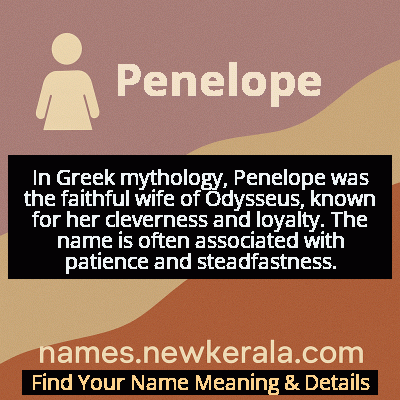Penelope Name Meaning & Details
Origin, Popularity, Numerology Analysis & Name Meaning of Penelope
Discover the origin, meaning, and cultural significance of the name PENELOPE. Delve into its historical roots and explore the lasting impact it has had on communities and traditions.
Name
Penelope
Gender
Female
Origin
Greek
Lucky Number
7
Meaning of the Name - Penelope
In Greek mythology, Penelope was the faithful wife of Odysseus, known for her cleverness and loyalty. The name is often associated with patience and steadfastness.
Penelope - Complete Numerology Analysis
Your Numerology Number
Based on Pythagorean Numerology System
Ruling Planet
Neptune (Ketu)
Positive Nature
Intuitive, analytical, spiritual, and inquisitive.
Negative Traits
Secretive, reserved, aloof, and can be overly critical.
Lucky Colours
Green, yellow.
Lucky Days
Monday.
Lucky Stones
Cat’s eye, moonstone.
Harmony Numbers
1, 5, 6.
Best Suited Professions
Scientists, researchers, spiritual leaders, detectives.
What People Like About You
Depth of knowledge, analytical skills, spirituality.
Famous People Named Penelope
Penelope Cruz
Actress
First Spanish actress to win an Academy Award and receive a star on Hollywood Walk of Fame
Penelope Fitzgerald
Novelist
Booker Prize winner regarded as one of Britain's finest post-war novelists
Penelope Ann Miller
Actress
Acclaimed film and television actress with numerous award nominations
Penelope Spheeris
Film Director
Groundbreaking director documenting punk culture and directing major Hollywood comedies
Name Variations & International Equivalents
Click on blue names to explore their detailed meanings. Gray names with will be available soon.
Cultural & Historical Significance
Extended Personality Analysis
People named Penelope often embody a unique combination of traditional virtues and modern intelligence that reflects their mythological heritage. They typically demonstrate exceptional patience and perseverance, able to work steadily toward long-term goals without becoming discouraged by temporary setbacks. This enduring quality is balanced by sharp intellect and creative problem-solving skills—Penelopes are often the ones who find innovative solutions where others see dead ends. Their loyalty runs deep in personal relationships, and they value authenticity and integrity above superficial connections. Many Penelopes possess artistic talents or appreciate aesthetic beauty, whether expressed through visual arts, writing, music, or personal style. They tend to be excellent communicators who listen carefully and respond thoughtfully, making them valued friends and colleagues. While they can appear reserved initially, Penelopes often reveal surprising wit and humor to those who earn their trust. Their strength lies in this balance of steadfast reliability and adaptive creativity, allowing them to navigate life's challenges with both principle and flexibility. This combination makes them particularly effective in careers requiring both analytical thinking and emotional intelligence, from education and psychology to arts and leadership roles.
Modern Usage & Popularity
In contemporary naming practices, Penelope has transformed from a somewhat old-fashioned choice to a highly fashionable and sophisticated option. The name's remarkable resurgence began in the early 2000s and accelerated through celebrity influence and cultural trends favoring vintage names with literary connections. In the United States, Penelope skyrocketed from position #745 in 2000 to breaking into the top 25 names by 2020, with similar dramatic increases seen in the UK, Australia, and Canada. This popularity reflects several contemporary preferences: the appeal of names with strong female associations, the trend toward longer, melodic names with nickname potential (Penny, Nell, Poppy), and the desire for names with historical depth that don't feel overly common. The name particularly resonates with educated, urban parents who appreciate its blend of classical elegance and modern spunk. Its international versatility—easily pronounced in multiple languages—adds to its global appeal. Current usage suggests Penelope has moved beyond trend status to establish itself as a modern classic, likely to maintain its popularity for the foreseeable generation.
Symbolic & Spiritual Meanings
The symbolic richness of Penelope extends far beyond her mythological role as the faithful wife. Her most potent symbol is the weaving loom, representing not just domestic craft but the active creation of one's destiny through patient, deliberate action. The act of weaving and unweaving becomes a metaphor for the complex interplay of construction and deconstruction in personal growth and life strategy. As a weaver of both fabric and fate, Penelope symbolizes the human capacity to shape circumstances through subtle, persistent effort rather than dramatic confrontation. The possible duck etymology adds another layer—ducks move gracefully between elements, symbolizing adaptability and the ability to navigate different emotional and intellectual realms. Psychologically, Penelope represents the integration of traditionally separate qualities: patience and action, loyalty and independence, tradition and innovation. She embodies what modern psychology might call 'strategic waiting'—the wisdom to recognize when immediate action is less effective than patient preparation. In contemporary symbolic terms, Penelope has become an emblem of 'quiet power'—the strength that operates through intelligence, timing, and endurance rather than overt force, making her particularly relevant in today's complex social and professional landscapes.

